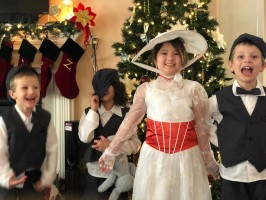On December 19, 1843, A Christmas Carol, by Charles Dickens was published. Capturing the zeitgeist or “spirit of the times”, acknowledging western observance of the season, Dickens is credited for inspiring several aspects of Christmas, including family gatherings, seasonal food and drink, dancing, games and a festive generosity of spirit.
If you are familiar with the story or the movie, you might remember that it surrounds a man named Ebenezer Scrooge, described as a “squeezing, wrenching, grasping, scraping, clutching, covetous, old sinner!” A painful personal history, Scrooge is a man who has hardened himself to the world, and surrounded himself with money, and thereby hoping to protect himself from further hurt.
Ah! But the season’s Spirits of love, life and magic will not let him alone, and as a result, three of them plan visits to him, for the purpose of helping him; to remember his past, remind him of persona, and extend to him the gift of renewal.
This timeless classic is a heartwarming story of a soul in need of healing, and the response of all heaven and earth to intervene on behalf of this one individual to bring restoration to his heart and soul and renew his sense of kinship with himself, his life and his surroundings.
The imagery of ghosts and spectres in our lives has historically been a familiar metaphor describing our internal experiences and feelings of being confronted, summoned, drawn, called, or invited to a new direction or a change in the course of our physical, personal, emotional or spiritual life. And the timeless Dickens’ classic, written and received like a famous gospel of redemption, might be considered one of the most recognized and influential works in its particular genre of English and American literature.
There are other artistic works since Dickens, that have also valued the use of ghosts as messengers in our lives. One, in particular, is the 2015 French movie, Blind Date. Starring Melanie Bernier and Director Clovis Cornillac, this romantic comedy surrounds a ghostly appearance that brings together two individuals and changes their lives from feeling alone to feeling loved.
What if you were a female, concert pianist, and felt the need to move to a quiet residence, for the purpose of polishing your art, in search of the sine qua non of its perfection?
And what if the residence, which you secured for refuge, instead of offering quiet, revealed a haunting presence; one of pictures on the wall, mysteriously moving by themselves, and creaking sounds in the woodwork, like the roaming of ghostly inhabitants with unfinished business?
How about if you were a very intelligent man, with a gift for inventing highly sought after multi-dimensional, abstract-strategy games, whose need for quiet concentration led you to create haunting sound effects in the apartment next to you, with hopes to dissuade anyone from renting it?
But then, what if your efforts to dissuade anyone from renting the apartment next to you, failed and the new renter, because she was curious, discovered your haunting scheme and confronted you through the walls? And what if, in the confrontation you both found yourselves in a contentious beginning, arguing through the thin walls, complaining about each other’s noise?
He needed quiet to create, as well as produce. She needed quiet to practice for performance. His tools for producing his games were noisy. Her piano was noisy. With the gauntlet established, each assumed an offensive position in the hope of gaining control to get their need met, a strategy of winning through intimidation.
The gauntlet began to crumble one evening, when she was practicing Chopin’s Revolutionary Etude, for a performance. And because he could hear it, and he had also grown up with a father who was a conductor for the opera, he knew the piece she played very well. Hearing her play through the wall, he tells her that her playing lacks emotion, and encourages her to let go of her self-consciousness, and to play the piece with real feeling. She follows his instructions, and the two finally become friends, talking to one another regularly from either side of the wall.
He nicknames her Machine, meaning “Whosit.” She nicknames him, Machin, meaning “Whatsit”. And although they still only communicate through the walls, their relationship begins to deepen.
Finally, the day of her performance arrives, and because of Machin’s instruction, she is able to let go of her self-consciousness and perform with the passion she has longed for. After the performance, she returns to her apartment and confesses to Machin that she wished she could have seen him after the performance — and that she wishes they could be together in reality, without the wall between them. To her surprise, Machin starts knocking through the wall to her apartment with a sledgehammer, and they finally see each other for the first time.
So while the apparitions in this romantic comedy were humanly contrived for the purpose of a scare tactic, we see that even the illusion of a ghost can result in an interpersonal transformation, inviting us to remember our humanness, remind us of the value of breaking down walls so we can respond to each other with open hearts and souls, and renew our joy, knowing that the contrasts are what makes the music beautiful, just like in Chopin’s Revolutionary Etude.
As Christmas Day gets closer, it is my hope that we can remember to honor our humanness and our past, that we can be reminded of our persona and the value of breaking down walls to respond to each other with open hearts, and renew our joy, with a sense of kinship, with ourselves, our lives and our surroundings.
Merry Christmas to all.
For the Support of Your Life
For the Many Sides of Life
Paulette Jackson LPC-MHSP













